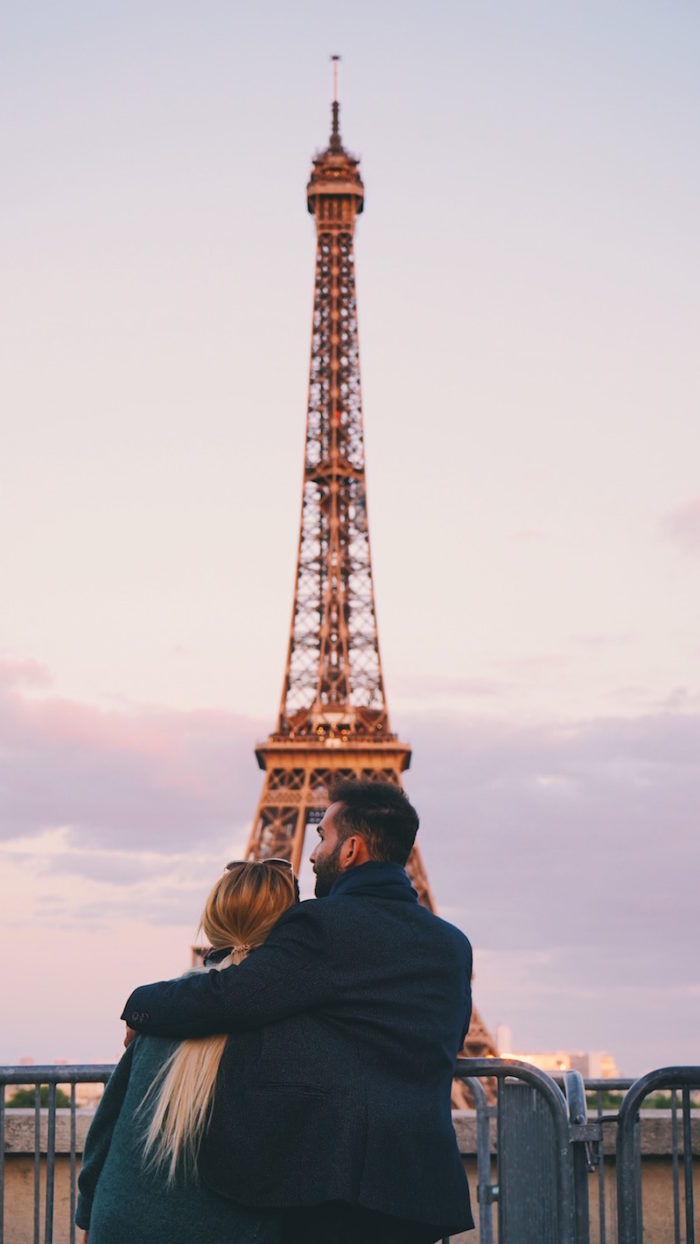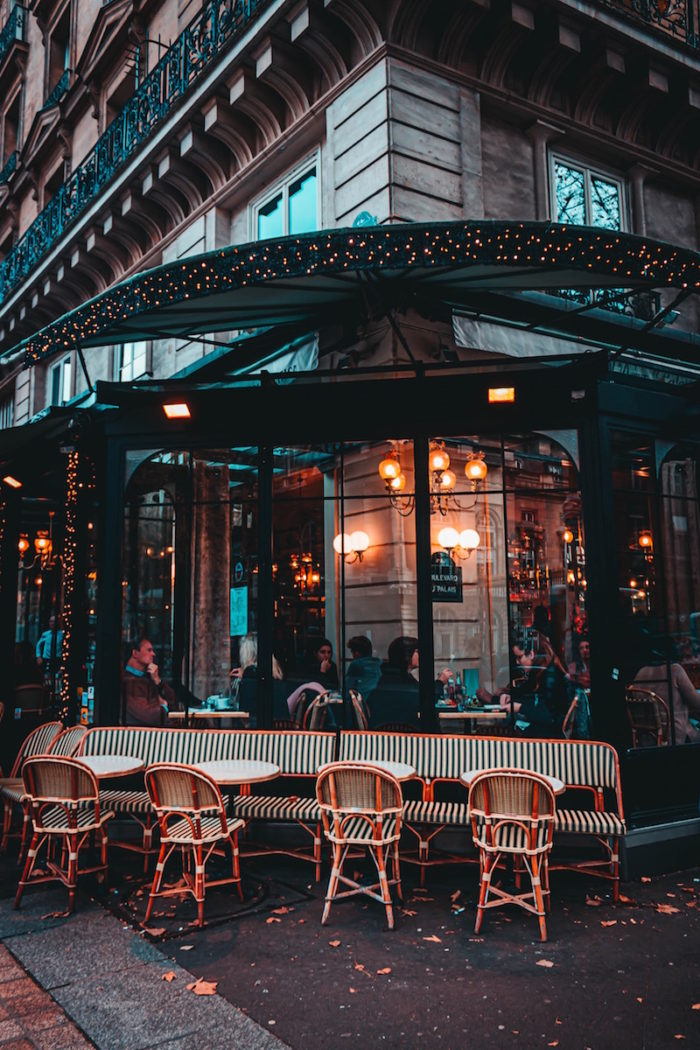 It was an affront to his culture, his sense of correctness, and to human history at large. It was wasteful and indulgent, ineffective, isolating, impolite and difficult. It didn’t make sense in our couple; our shared interests were already few, why add this? It was akin to religion: based on nothing but belief and regulation. Going vegan was offensive and wrong on all these levels. And, what would I do when we visited his family in France?
It was an affront to his culture, his sense of correctness, and to human history at large. It was wasteful and indulgent, ineffective, isolating, impolite and difficult. It didn’t make sense in our couple; our shared interests were already few, why add this? It was akin to religion: based on nothing but belief and regulation. Going vegan was offensive and wrong on all these levels. And, what would I do when we visited his family in France?
We had been married a little over two years when I started having misgivings about eating meat. I’m not entirely sure why; I’ve experimented with vegetarianism at various times in my life but it was always more about health than animal welfare. Perhaps it had something to do with homecoming. We had just moved to the states from his native France, where we had lived for the previous six years. During that stretch, I’d made a concerted, if clumsy, effort to live à la française. I learned the art of winning administrative personnel to my cause, despite their seemingly hell-bent attitude to do anything but be helpful; I learned to appreciate the four seasons and the value of a hard one spot on a café terrace in late spring; I was initiated into the world of scarves, which, being from southern California, seemed entirely glamorous and chic; and, I navigated a public transportation system that taught me how to read a metro map, push my way out of a crowded tram somewhat politely, and the delicate act of not breathing directly onto a face hovering just centimeters from my own. Needless to say, it was an education.
However, I think what I did best in France was eat. I ate croissants and pain au lait, steak au poivre with pommes frites, poulet rôti, coq au vin, crêpes bursting with cheese and ham, platters of charcuterie, oysters and mussels and crab, and—because it’s France—veal and foie gras. So much foie gras. Even as a non-vegan, before living abroad I found the concept of fatty duck liver distinctly unappealing. Yet, once I was fully committed to life in l’hexagone, I decided to liberate myself from all my decidedly provincial preconceptions. I wanted to try. And so for several years, under the protective shield of cultural curiosity and courtesy, I tried everything. I don’t regret the experience, nor the attitude; I was interested in living like a French person, what better way than through the plat du jour?
Love, like culture, is shared through food. Love blossoms under bites of crusty baguette smeared with pâté, fait à la maison. Love teaches us how to order un filet de boeuf au point, how to properly and gracefully eat a fish served whole, how to appreciate a cherry glaze on magret de canard. Love comes in three: entrée, plat principal, and dessert. Love chooses different courses so each can be shared and no one is denied their favorites or their curiosity.
And so, love can suffer under a dietary regime change. I think my husband felt betrayed. He had shared his culture with me, his food, and his way of eating. We’d fallen in love in Michelin-rated restaurants but also in the quiet intimacy of his apartment, where he prepared so many wonderful meals for me. Over the course of perhaps one month, it all began to change. I felt strange about eating animals, I said shortly after returning to the U.S. The rustic charm of what is sometimes referred to as peasant food began to crumble as I realized the implication of that term was squarely misleading. It connotes a sort of noble simplicity rendered from an understanding of and traditional utilization of the land, something that is flagrantly opposite to the vast majority of how animal agriculture is effectuated today, particularly in this country. The industrialization of meat and animal products leaves no room for respectfully and humanely raising and slaughtering animals (an odd concept in itself), nor for the proper stewardship of the environment, and yet the myth flourishes.
 I fell out of love with meat, but perhaps it felt to my husband that I had fallen out of love with him. He didn’t want to encourage the disunion; he laughed at my salads, scoffed at my tofu, became belligerent over my efforts to avoid anything that had been cooked in butter, and seemed at times angry at every vegetable he encountered, as if it were part of the resistance. He treated me like a spoiled child; over indulged and coddled, willfully naive to the way things were. The best argument, the one that really got me, was this: had I been poor, the privilege of this type of thinking would have never been available to me. I was so first world, and what was worse, hypocritical. Would I go full vegan? Why hadn’t I thrown out all my leather? What about the loads of other societal travesties and injustices that warranted protest? Was I simply choosing this one conviction over thousands of others that weren’t as easily supported by conveniently packaged and righteously marketed products lining the shelves at Whole Foods?
I fell out of love with meat, but perhaps it felt to my husband that I had fallen out of love with him. He didn’t want to encourage the disunion; he laughed at my salads, scoffed at my tofu, became belligerent over my efforts to avoid anything that had been cooked in butter, and seemed at times angry at every vegetable he encountered, as if it were part of the resistance. He treated me like a spoiled child; over indulged and coddled, willfully naive to the way things were. The best argument, the one that really got me, was this: had I been poor, the privilege of this type of thinking would have never been available to me. I was so first world, and what was worse, hypocritical. Would I go full vegan? Why hadn’t I thrown out all my leather? What about the loads of other societal travesties and injustices that warranted protest? Was I simply choosing this one conviction over thousands of others that weren’t as easily supported by conveniently packaged and righteously marketed products lining the shelves at Whole Foods?
It was a bit of a disaster. I listened to Natalie Portman answering questions about veganism recently, one of them being “can a vegan date a non-vegan?” Her answer was an emphatic yes, because of course everyone is free to eat what they like, it’s a personal decision, and her husband eats everything. How lovely! How simple! To each their own, right? Live and let live.
But it’s not always so easy. Food is important, it matters deeply to individuals for as many reasons as there are people. The idea of wastefulness deeply offends my husband. He cringes and curses at throwing leftovers out if we don’t get to them in time. Early concepts of sustainability were nurtured in him from a young age and bear little resemblance to the self-congratulatory version that often fuels the movement today. He was brought up in a traditional way that truly did disparage excess and waste. Food was something to be grateful for, and pickiness was not suffered well. His grandparents faced scarcity and hunger during the Second World War; refusing perfectly good food, or rather, turning one’s nose up at perfectly good food, was an incomprehensible insult to firmly held notions of what was correct. In other words, a giant faux pas.
And still, I don’t want to eat meat. It’s been over a year since I gave it up, and while I can’t say that I’ve maintained strict veganism, I don’t see myself returning to omnivore status. Still, marriage, as it were, demands concessions, and I’ve made some. But so has he. With time, the fervor of his frustration waned. We met somewhere near the middle; he abhors the waste and obligate cruelty of factory farming and accepts vegetarian, even vegan meals, from time to time. I no longer give myself over to moral panic if I suspect butter in a restaurant meal. We’ve worked out meal plans that now usually mean shared sides while he sticks to meat as his main and I to tofu for mine. It may not always be as romantic as it once was, but I suspect that loss may have happened with time anyway. The rather abrupt trauma of my decision, however, forced us to examine our beliefs about food, family, and habit, and has ultimately been an intensive course in compromise.
So, we don’t eat the same things anymore. But we are also not a new couple anymore, exploring each other over champagne toasts or bites of brioche. We know each other. Food doesn’t have to be a shared interest because we share so much more than meals. The battle lines may persist—my Earth Balance sits defiantly next to his Irish butter; I politely refuse his offer of a new pair of leather sandals; he smiles triumphantly when I opt to eat a pizza that mistakenly comes sprinkled with cheese, rather than send it back. But for now at least, the war has its truce. There is peace at our table, and perhaps a better understanding of one another.
We’ll see how Christmas in France goes.
More in Voices: How I Use Veganism To Cope With Toxic Masculinity & Redefine What It Means To “Be A Man”
What Françoise Sagan & Bonjour Tristesse Taught Me About Pleasure In Life à la française
Get more like this—Sign up for our daily inspirational newsletter for exclusive content!
__
Photo: AC Almelor on Unsplash; Mat Reding on Unsplash




